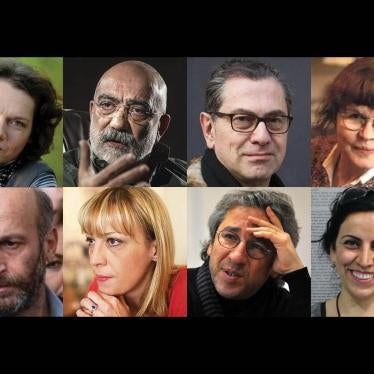Police in Uzbekistan have arrested a human rights defender who may be at risk for torture or ill-treatment, Human Rights Watch said today.
On May 24 police in Karshi arrested Yuldash Rasulov, whose work for the Human Rights Society of Uzbekistan (HRSU) focuses on the crackdown on independent Muslims. Rasulov, who is in his thirties, cannot afford independent legal defense, and it is unclear whether he has had access to state-appointed counsel.
"It seems that Rasulov has no lawyer of his own choice, and Uzbekistan's got a shocking record on torture," said Elizabeth Andersen, executive director of Human Rights Watch's Europe and Central Asia division. "We're very concerned about what police may be doing to him at this very moment."
Police brought Rasulov from Karshi, in Kashkadaria province, to Tashkent, where he is being charged with "religious extremism." According to HRSU, Rasulov has been a member of the rights group since 2000, gathering information on the arrests of those whose religious practices and affiliations fall beyond the confines of state-sponsored Islam. Police claim that Rasulov had been recruiting Islamic militants; HRSU denies that he was involved in any religious "extremist" activities of any sort, much less those aimed at violent challenge to the state. A search of his family's home found nothing incriminating.
Rasulov is known to be a religious man who prays five times per day, which, Andersen said, may explain why police chose to target him. "Thousands of people are in prison in Uzbekistan because of their religious practices and affiliations. In many of these cases, police considered praying five times per day a suspicious activity. With Rasulov's case, the authorities also appear to be trying to discredit his group's human rights work."
Responding to concerns about police torture, on Monday a police official who said he was "personally dealing with [Rasulov's] case" said that "there had been no torture." But according to HRSU, police beat one of two other men whom they detained in relation to the Rasulov case. The man was subsequently released.
Another HRSU member from Kashkadaria province, Shovrik Ruzimuradov, died in police custody in July 2001 clearly as a result of torture. Police denied that he had been tortured.
On May 27, Tashkent police broke up a small demonstration at the Ministry of Internal Affairs building protesting Rasulov's arrest. Police dispersed the peaceful protest, detaining Bakhtior Khamraev and Yadgar Turlibekov, as well as Tulkin Kuraev, a Voice of America correspondent and member of HRSU, and Dmitri Aliaev, a BBC correspondent. All four were released between one and two hours later. No charges were pressed. The Uzbek government continues to unlawfully arrest or detain those who meet privately for prayer or Islamic study, who belong to Islamic groups not registered with the government or who possess Islamic literature not generated by the government, singling them out for nothing more than the peaceful expression of their religious beliefs. Local human rights groups estimate that 7,000 independent Muslims are currently in prison in Uzbekistan.
In the past week the government has also cracked down on Uzbekistan's secular political opposition. On May 25, activists from the opposition party Erk were planning to gather in Tashkent. That morning, police detained Otonazar Oripov, a prominent Erk member, and held him until 5:00 p.m., scuttling the planned meeting. Erk lost its registration in 1993. Since then, some of its members have been either jailed or forced into exile.







